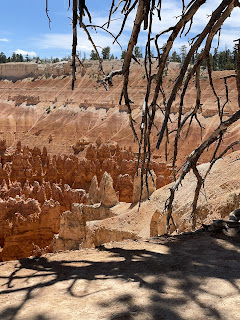Coming out of a restaurant last week with friends, we were caught off guard by a bright object racing across the sky. We were near the airport, so some in our group thought it was a jet's contrail caught in the afterglow of the setting sun. As we monitored the progress of this celestial body, we noticed pieces falling off!
It wasn't until I was home that I searched for recent launches from Vandenberg, the Air Force Base located almost 300 miles north of San Diego. A Spacex Falcon 9 rocket had been launched at the time we were standing outside.
 |
| Has something unexpected happened in your life? (Photo: Spacex Falcon 9 rocket from Vandenberg AFB - Larry Gardepie) |
It
took a few minutes for the object to be out of sight and another
20 minutes for the contrail to disappear into the darkening night sky.
What remained? I was transfixed by the timing and beauty of this
unexpected sighting.
Being Surprised out of the Ordinariness of our lives is sometimes nice! My friends and I stopped, watched, and wondered. We talked about what we thought it might be, and we accepted the various options. No one tried to convince the others: we didn't know what we were seeing, so we listened and allowed curiosity to suspend our judgement.
 |
| What beauty have you encountered this week? (Photo: Cherry Blossoms - Larry Gardepie) |
Like the various stages of the Falcon 9 rocket separating and falling away, being surprised opens us to possibilities by jettisoning routine behaviors and roles.
Being surprised can come in different forms: later that same week, I was walking around my neighborhood with another friend. We came across a beautiful, flowering tree. We walk this route several times a week and had not noticed this tree. But today it was magnificent!
 |
| Do you go out of your way to be surprised? (Photo: Blue Flowers - Larry Gardepie) |
On another walk I saw a blue flower off the beaten path. I was drawn to its unusual beauty, so I walked over to be closer. I delayed my walk. Time stopped. I paid attention to its uniqueness, standing alone among the other plants.
I wonder:
- How many times are we with a friend and don't pay attention to that person's beauty?
- How many times do we have to be surprised into noticing the extraordinary ordinariness of life?
- How often do our rote patterns hide what is present all along?
Are we ready to be surprised this week?
 |
| Larry Gardepie (click on link for website) |




























